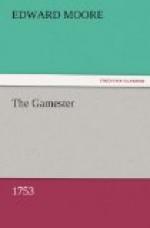Follies, if uncontroul’d, of every
kind,
Grow into passions, and subdue the mind.
(V, 4)
Further each commission of sin causes progressive loss of grace, without which man cannot act rightly. In prison Beverly is incapable of prayer ("I cannot pray—Despair has laid his iron hand upon me, and seal’d me for perdition..."). However, a benevolent deity touches him with the finger of grace, enabling him to repent ("I wish’d for ease, a moment’s ease, that cool repentance and contrition might soften vengeance"). He can now pray for mercy and in his dying moments is vouchsafed assurance of forgiveness ("Yet Heaven is gracious—I ask’d for hope, as the bright presage of forgiveness, and like a light, blazing thro’ darkness, it came and chear’d me...").
In this aspect Moore is working along the lines laid down by Hill, but there is a significant difference, attributable perhaps to the weakening of orthodox theology and the spreading influence of the Shaftesburian school of ethical theorists. In the older theology, man’s progressive loss of grace correspondingly releases his natural propensity for evil, and working in these concepts neither Hill nor Lillo hesitated to show his hero descending to murder. Moore, influenced perhaps by the ethical sentiments of the day, compromised his theological concepts and permitted his hero no really evil act (excluding of course his suicide), and stressed instead Beverly’s mistaken trust in Stukely, who is, as Elton has pointed out, a “Mandevillian man” (Survey of English Literature: 1730-1760, I, 329-30).
There is another significant difference between the two plays which reflects the development of religious thought in the first half of the eighteenth century. Commenting on the too-late arrival of the news of the uncle’s death, Elton remarks that “this too-lateness... which is in the nature of an accident, is a common and mechanical device of Georgian tragedy” (I, 330). Hill employed the device, the good news coming as a complete surprise, but he made it part of a carefully ordered plot designed to reveal the direct intervention and mysterious workings of a particular Providence, making characterization and action consistent, and giving his play a precise theological significance. In Moore’s day, however, under the impact of deism and the developing rationalism, the concept of a particular Providence in orthodox theology had become so subtilized that the older idea of direct and striking intervention in human affairs all but disappeared. By mid-eighteenth century, deity, as Leslie Stephen points out, “appears under the colourless shape of Providence—a word which may be taken to imply a remote divine superintendence, without admitting an actual divine interference” (History of English Thought In the Eighteenth Century, II, 336). The references to Providence in Moore’s play are of this type, pious labels on prudential morality. Moore carefully avoids the various




